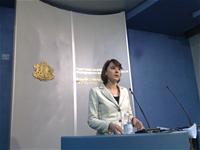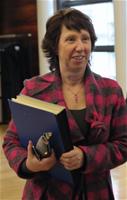Sofia is hoping to get one EU ambassador
Ralitsa Kovacheva, March 30, 2010
 Bulgaria will consider a success getting one head of mission position from 32 announced vacancies for heads of EU diplomatic missions in third countries. The procedure is part of a regular rotation of diplomatic representatives, which so far headed the delegations of the European Commission. With the entering into force of the Lisbon Treaty, the missions become EU representations and are under the control of the European External Action Service. According to the spokesperson of the Bulgarian Foreign Affairs Ministry Vessela Tcherneva, Bulgaria is hoping to get one position for an ambassador in a country from the Black Sea region or the Balkans, because it is there where "we have interests and expertise", she added.
Bulgaria will consider a success getting one head of mission position from 32 announced vacancies for heads of EU diplomatic missions in third countries. The procedure is part of a regular rotation of diplomatic representatives, which so far headed the delegations of the European Commission. With the entering into force of the Lisbon Treaty, the missions become EU representations and are under the control of the European External Action Service. According to the spokesperson of the Bulgarian Foreign Affairs Ministry Vessela Tcherneva, Bulgaria is hoping to get one position for an ambassador in a country from the Black Sea region or the Balkans, because it is there where "we have interests and expertise", she added.
There are no quotas for EU member states and the competition would be based on qualification, this is why it is important for us to have good candidates and to get one position of a head of a mission, which would be a success, Tcherneva said. The new EU member states insisted, when the Diplomatic service is being established, the principle of geographic balance to be taken into account in order to ensure that younger member states would not be less represented - firstly, because the representatives of old member states dominate in the current bodies of the Union (where 2/3 of the EEAS personnel would come from) and, second, because the candidates from the "old" EU nations have greater experience and longer careers in European institutions.
According to Bisserka Benisheva, director general of GD European Affairs at the  Bulgarian foreign ministry, the broad geographic balance is included as a principle in the legislation establishing the EEAS, headed by the High representative for Foreign Affairs Catherine Ashton. Ms Ashton assured that member states would get proportionate representation in the diplomatic service, not immediately, but within the next 3 years when the natural rotation of EU missions abroad took place, Bisserka Benisheva explained. Soon it is expected competitions to be announced for another 35 positions in EU's representations in third countries, where the new member states would also be able to take part.
Bulgarian foreign ministry, the broad geographic balance is included as a principle in the legislation establishing the EEAS, headed by the High representative for Foreign Affairs Catherine Ashton. Ms Ashton assured that member states would get proportionate representation in the diplomatic service, not immediately, but within the next 3 years when the natural rotation of EU missions abroad took place, Bisserka Benisheva explained. Soon it is expected competitions to be announced for another 35 positions in EU's representations in third countries, where the new member states would also be able to take part.
The process of national selection for positions for the EEAS itself will also start quite soon. Bulgaria will provide a list of candidates but the actual selection would be done by EEAS secretary general. This will be done according to criteria for the different levels of hierarchy which will be developed after the Service is established. The national selection criteria will be ready within days. The Ministry of Foreign Affairs is willing to open the process for potential candidates as much as possible, which means that the institution might look for them outside the Ministry, the spokesperson Vessela Tcherneva explained.
Catherine Ashton's plan for the organisation and functions of the new European External Action Service was surprisingly presented on the eve of the spring European Council in Brussels. A day earlier, the proposal was approved by the European Commission. A group of MEPs from all political groups in the European Parliament rebuffed the proposal as unacceptable and made it clear that it might not be supported. The dialogue among the Commission, the Parliament and member states on the structure of the EEAS is still going on. The plans are, however, the process of establishment of the Service to be over by the end of April.
 Federica Mogherini | © Council of the EU
Federica Mogherini | © Council of the EU | © Council of the EU
| © Council of the EU Luis De Guindos | © Council of the EU
Luis De Guindos | © Council of the EU